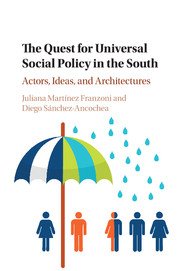Book contents
- Frontmatter
- Contents
- List of Figures
- List of Tables
- Acknowledgements
- List of Abbreviations
- Part I Universalism in the South
- 1 Introduction
- 2 Universalism in the South: Definition and Relevance
- Part II A Comparative Study of Policy Architectures
- Part III Building Universalism in Costa Rica
- Part IV Conclusions
- References
- Index
1 - Introduction
from Part I - Universalism in the South
Published online by Cambridge University Press: 10 November 2016
- Frontmatter
- Contents
- List of Figures
- List of Tables
- Acknowledgements
- List of Abbreviations
- Part I Universalism in the South
- 1 Introduction
- 2 Universalism in the South: Definition and Relevance
- Part II A Comparative Study of Policy Architectures
- Part III Building Universalism in Costa Rica
- Part IV Conclusions
- References
- Index
Summary
The Renewed Attention to Universalism
“Health care is a right for everyone in every country, rich and poor. Our commitment is universal,” the World Bank's President Jim Yong Kim claimed in early 2014. He is not alone in his call. Policy proposals aimed at achieving universalism have flourished (Filgueira et al., 2006; ILO, 2011; UNRISD, 2010), as has far-reaching policy experimentation (Cotlear et al., 2014; Huber and Stephens, 2012; Martínez Franzoni and Sánchez-Ancochea, 2014; Pribble, 2013). The term has gained traction among policymakers in national and international institutions: the World Health Organization (WHO) is pushing for universal health coverage; the United Nations (UN) is promoting a global social protection floor; and a number of countries across the South, particularly in Latin America, have introduced reforms labeled as universal. The growing attention to full coverage and equity in the post-2015 international agenda has expanded the interest on these goals even further (Fischer, 2012).
This policy attention coincides with the emergence of a new middle class that across the South demands better and more affordable social services (Pezzini, 2012). Economic growth, improved wages, and more access to credit has rapidly expanded the number of the non-poor: in Latin America, for example, the number of people within the middle class is now equal to the amount of those in poverty (Ferreira et al., 2012). And the expansion is far from over: estimates indicate that, across the world, the middle class will increase from 1.8 billion in 2009 to 3.2 billion in 2020 and 4.9 billion in 2030 (Kharas, 2010). Although upward mobility has granted these groups new consumption and investment opportunities, they still share many characteristics with the poor. They are what the Financial Times depicts as “the fragile middle” (Burn-Murdoch and Bernard, 2014): people who are just “one illness away” from falling back into poverty (Krishna, 2010) and in need of high quality services and transfers.
Despite its growing social, academic, and policy relevance, few studies have focused on how universalism should be understood across the South; what its core features are; and how it can be built and sustained. Most comparative literature explains the level, composition, and/or redistributive power of social spending (Haggard and Kaufman, 2008; Segura-Ubiergo, 2007).
- Type
- Chapter
- Information
- The Quest for Universal Social Policy in the SouthActors, Ideas and Architectures, pp. 3 - 26Publisher: Cambridge University PressPrint publication year: 2016



